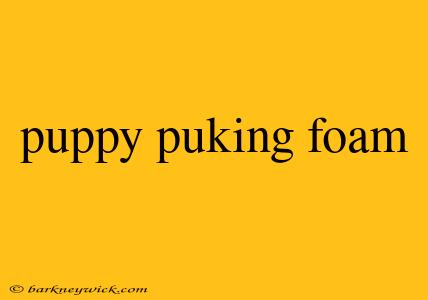Why Is My Puppy Puking Foam? Understanding and Managing Puppy Vomiting
Remember that adorable little ball of fluff you brought home? The one who chewed on everything, wagged its tail incessantly, and had the biggest, most innocent eyes you'd ever seen? Well, that adorable puppy is now showing a different side - one that involves a lot of foam and a whole lot of concern. Puking foam is a common issue with puppies, and while it can be alarming, it's often not as serious as it looks. Let's explore what's happening, why it's happening, and what you can do about it.
A Personal Story: The Day My Puppy Turned into a Vomit Volcano
I remember the day my puppy, a rambunctious golden retriever named Sunny, became a foam-spewing volcano. He had gobbled down an entire bowl of kibble in record time, followed by a questionable amount of "borrowed" laundry from the hamper. Minutes later, it was a literal white-out in the living room as Sunny unleashed a torrent of foamy vomit. It was messy, it was smelly, and it was undeniably concerning. This wasn't a normal puppy puke, and I was left with a sense of panic.
Understanding Puppy Vomiting
While foam puke is unnerving, it's actually a common occurrence in puppies. Think of it like a "puppy hiccup" - a harmless way for their bodies to expel excess gas, air, or undigested food. It's often a symptom of something simple, like:
- Overeating: Like my Sunny, puppies are notorious for their bottomless pits of stomachs. Eating too quickly or too much can lead to indigestion and foamy vomiting.
- Eating non-food items: Chewing and ingesting items like socks, toys, or even grass can cause irritation and vomiting.
- Stress: New environments, changes in routine, or even excitement can trigger vomiting in puppies.
- Underlying medical conditions: While less common, foam puke can sometimes indicate more serious issues like parasites, infections, or even metabolic disorders.
When to Worry: Recognizing Red Flags
It's essential to understand that not all puppy vomiting is the same. Here are some signs that might indicate a more serious problem that needs immediate veterinary attention:
- Persistent vomiting: If your puppy is vomiting frequently (more than once a day) or for extended periods, don't hesitate to contact your veterinarian.
- Blood in vomit: Blood in vomit is never normal and requires urgent veterinary care.
- Lethargy and lack of appetite: These symptoms could be signs of dehydration, a more serious underlying illness, or even intestinal blockage.
- Diarrhea: Vomiting paired with diarrhea can be a symptom of a viral or bacterial infection.
What You Can Do: Preventing and Managing Puppy Vomit
- Feed smaller, more frequent meals: This can help prevent overeating and indigestion.
- Provide fresh, clean water: Dehydration can contribute to vomiting, so ensure your puppy has access to clean water at all times.
- Monitor your puppy's diet: Stick to a high-quality puppy food recommended by your veterinarian.
- Keep your puppy's environment safe: Remove potentially hazardous items like toys, socks, and other small objects.
- Minimize stress: Create a calm and predictable environment for your puppy.
- Consult your veterinarian: If you're concerned about your puppy's vomiting, never hesitate to seek professional advice.
The Takeaway: Your Puppy's Vomit is a Conversation Starter
Like Sunny's foam-tastic episode, puppy vomit can be a messy but ultimately informative experience. By recognizing the potential causes, recognizing red flags, and taking appropriate action, you can ensure your puppy's comfort and well-being. Remember, communication is key – talk to your veterinarian about your concerns and they can help you determine the best course of action. With a little understanding, a little patience, and a little help from your veterinarian, you can navigate this often-messy phase of puppyhood with confidence.
